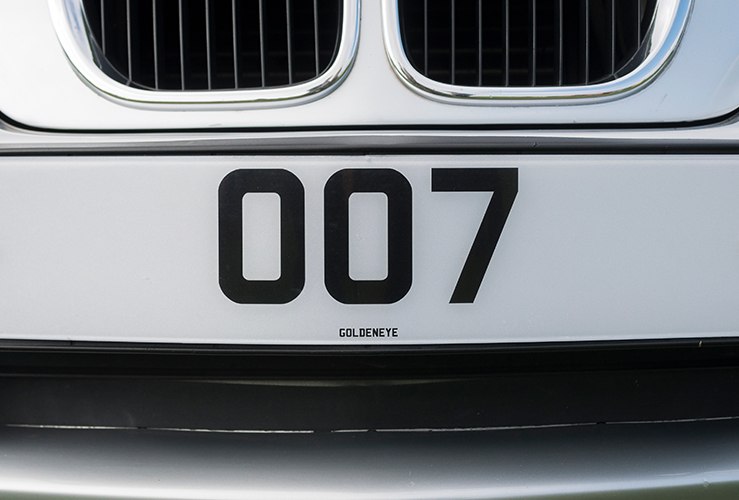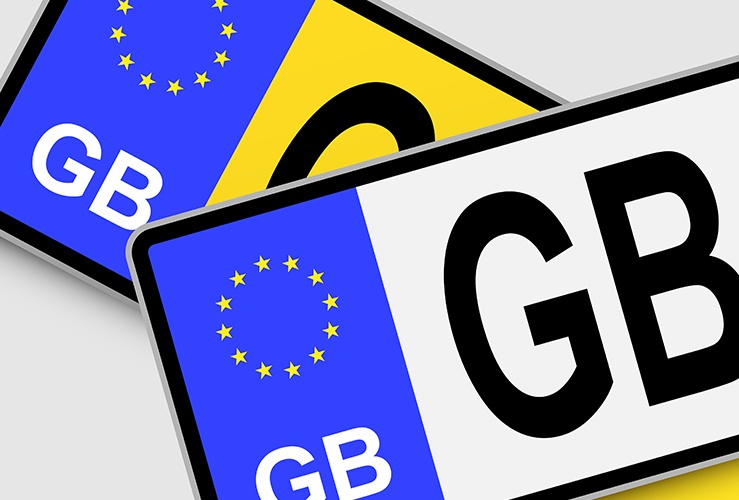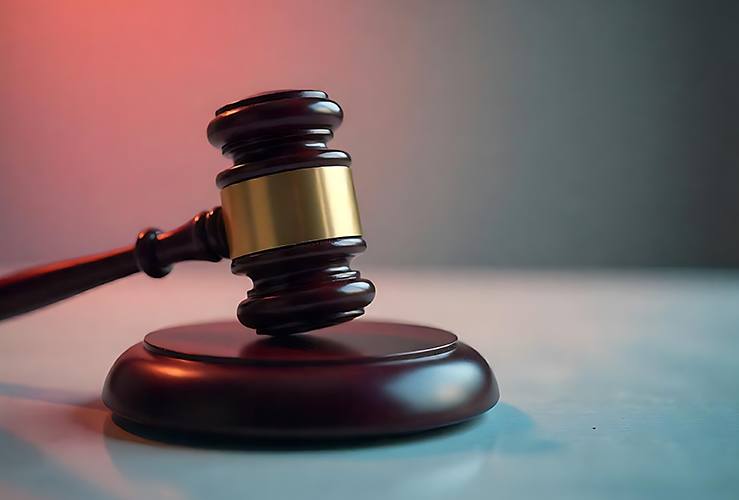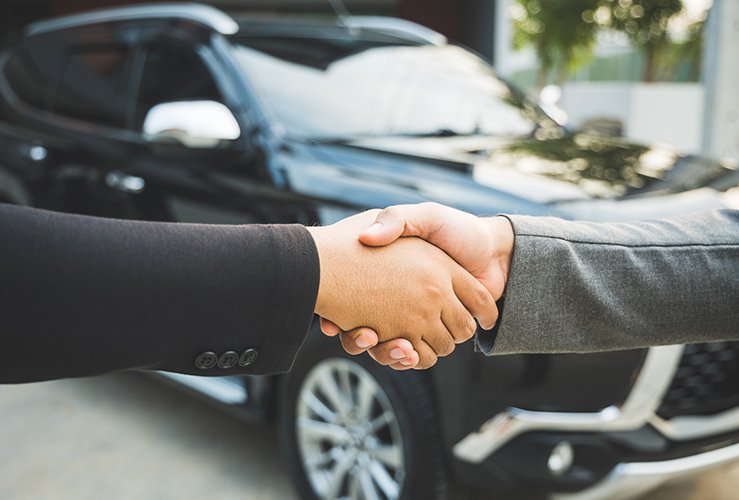How do personalised number plates work? Where can you buy them? And what rules must you follow? Here’s all you need to know about number plates - personalised, humorous, or simply eye-catching.
Number plates: Personalised — just for the wealthy?
Until fairly recently, the private number plate was the preserve of the rich and famous.
Lord Alan Sugar, for instance, bought the plate “AMS 1” in reference to his initials (Alan Michael Sugar) and his now-defunct computer firm, Amstrad.
Elton John, too, has been a keen collector of private number plates, having bought B1G - and similar variations over the years.
Even the Duke and Duchess of Cambridge are not averse to an eye-catching number plate, having fixed “JU5T WED” to their wedding car in 2010. However, that was for purely decorative purposes, and didn’t meet the DVSA guidelines (more on these rules later).
Your number plate: Personal, private and unique
Today, however, people of more modest means buy private number plates.
But the cost of doing so varies greatly: What might be sought after for one person, might be of no interest to the general public - meaning some unique plates can be inexpensive to pick up.
Plates with broader appeal, however, can fetch many thousands of pounds.
Given this increased interest, it's no surprise that private number plate sales have doubled in the UK over the last decade. In 2024 alone, over 1.2 million transactions were recorded, generating £276 million for the government.
But why do UK motorists love private plates so much?
According to motoring journalist Quentin Wilson, “For a motoring-obsessed nation they are a suburban trinket. A number plate is a form of automotive jewellery. You can either change your car or change your number plate, and changing your number plate is cheaper."
However, many see private number plates as an investment. Some specialists buy private plates for a relatively affordable sum, with a view to selling them on for a handsome profit.
Registration plates: Personalised to suit you
Thinking about buying a private number plate? Here's everything you need to know before diving in.
What are private number plates?
Private number plates are custom vehicle registration numbers that differ from the standard format issued by the DVLA. Instead of a typical plate like "AB21 XYZ", a private plate might read "J0 HNS" or "M4RY", often spelling out names, words, initials, or dates.
These plates are legal as long as they follow DVLA rules on format, spacing, and font. Additionally, they must not make a vehicle look newer than it is (by using the incorrect DVLA “age identifier” - if applicable).
Read on to find out how personalised number plates work.
Number plates: Private jokes, branding & investments: Why people buy them
- Number plates: personalised: Show off a name, initials, or inside joke.
- Business Branding: Great for company vehicles—e.g., “TAXI 1” or “C4KES”.
- Anonymity: Some people might use private plates to obscure the age or identity of their vehicle (although the former is not permitted).
- Investment: Certain plates appreciate in value and are bought purely for resale.
- Gift Giving: Private plates are often purchased as memorable, personalised gifts.
How much do private plates cost?
Prices vary wildly—from £250 for standard DVLA plates to hundreds of thousands of pounds for rare or highly desirable combinations.
Examples:
- Basic initials (e.g. “JON 123”) – from around £500
- Short, memorable words (e.g. “F1”, “VIP 1”) – often six-figure prices
- Dateless plates (no year identifier) – considered the most prestigious and can cost thousands
Where can I buy a private number plate in the UK?
Here are the main places you can buy a private number plate in the UK:
- DVLA Auctions and Website
- The official DVLA platform offers a wide selection of plates, including fixed-price options and auctions. This is usually cheaper than buying from other sources - see below.
- Private Dealers and Marketplaces
- Sites like Regtransfers, Plate Hunter, and National Numbers specialise in private plate sales. As mentioned, these options are often more costly than buying from the DVLA.
- From Private Individuals
- Often found on classified sites like AutoTrader, eBay, or social media.
When making a purchase, it’s critical that you ensure ownership documents are genuine and that the plate is eligible for transfer.
How do you transfer a plate to your vehicle?
Once you've bought a plate, you'll receive a V750 (certificate of entitlement - for previously unassigned plates) or a V778 (retention certificate - for future use or if you transfer it to another vehicle).
To assign your plate:
- Go to the DVLA website.
- Use the certificate to assign the plate to your vehicle online or by post (doing it online will be quicker).
- You’ll receive a new logbook (V5C) with the updated registration.
- Attach the new number plates to your vehicle—make sure they're legal in design!
Rules for attaching private number plates in the UK
- Both front and rear plates must be fitted
- A white plate must be displayed on the front.
- A yellow plate must be displayed on the rear.
- Both must be made from the correct reflective material.
Correct placement
- Plates must be securely fixed to the front and rear of the vehicle.
- They must be in a vertical, upright position.
- They must be clearly visible from head-on and behind — not obstructed by bike racks, tow bars, or dirt.
Proper attachment methods
You can attach number plates using:
- Adhesive pads (very common - and neat)
- Screws with plastic covers (ensure no damage to plate characters)
- Plate holders or surrounds (popular for quick changes)
Do I need to tell my insurer?
Yes. You must inform your insurer once the change is made. This is because the number plate is part of your vehicle’s legal identity. Your plates are used by police to check insurance and MOT status. If your plates aren’t registered, police may pull you over for being technically uninsured. ANPR (Automatic Number Plate Recognition) cameras are used for this.
What rules should you know?
The following design rules must be followed when using a private number plate.
- No mis-spacing or altering fonts to make a plate resemble a word or name.
- You can’t make a vehicle appear newer than it is by using a newer-style plate.
- Plates must meet British Standard regulations for reflectivity, character size, and spacing.
Offenders can face fines of up to £1,000 and even have the plate revoked.
Can I keep or sell my plate later?
Yes. You can:
- Retain a plate (if you're selling the vehicle or want to keep it unused).
- Sell it to another buyer (but you must ensure the relevant DVLA paperwork is transferred correctly).
When it comes to number plates, private ones can increase in value over time, especially those that are short, word-like, or include popular names.
Can you swap them between vehicles?
Yes, you can transfer a private plate from one vehicle to another, provided both are registered with the DVLA and meet the transfer conditions.
You may need to place the plate on retention first. This means temporarily removing the plate from a vehicle and storing it on a Retention Certificate (V778) so it can be:
- Kept for later use, or
- Transferred to another vehicle at a later time
It’s a bit like putting the plate “on pause” without losing your right to it.
In conclusion
Private number plates offer more than just a cosmetic upgrade—they’re a mix of personal branding and fun. With the right plate, you can make a statement every time you drive.
They may also prove to be a prudent investment.
Remember:
- Keep to DVLA rules
- Consider your budget - and the plate’s long-term value
- Double-check paperwork before buying
Whether you're looking for something bold, meaningful, or subtle, there’s sure to be a private number plate out there for you.









